Day 2 (24/6) - Shanghai: Walkabout, Museum, French Concession (Part 2)
***
Ed: The pictures in this post were restored in late December 2010 after Mediafire deleted my account in 2007. The two post titles are different for historical reasons (I have left the original title in bold while using a more useful one as the bona fide one)
(When last we left off, I was looking at the American Art exhibition in the Shanghai art museum)
There was a refreshing breath of realism with Bechtle's "'71 Buick", 1972, making it very out of place. Unfortunately there was also a very wth piece, even by the standards of modern art - Mangold's Distorted Circle Within A Square, 1973. It was literally a circle sitting almost snugly inside a square (with a little extra space to the circle's right), and I was observing to Johnny Malkavian that knowing these artists, it was probably a circle within a distorted square.
'Untitled' by Marden, 1956 was just a black square and confirmed that 'Untitled' pieces are rubbish (this held true in the Singapore Art Museum as well).
Then it was back to real art.

Green glazed pottery watching tower. E. Han. 25-220AD.
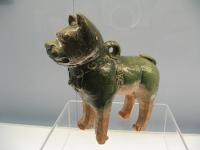
Green glazed pottery dog. E. Han. 25-220AD.

Pottery duck with low fired green glaze. E. Han. 25-220AD.

Green pottery camel. Sui. 581-618AD.
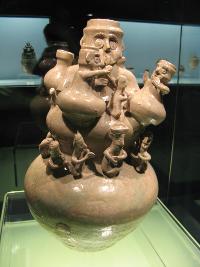
Celadon jar with modeled human figures. Wu Zhou ware. Wu. 222~280AD
Eee. Evidently pottery making took a step back.
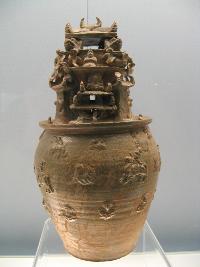
Celadon jar with modeled human figurines, birds and architecture. W. Jin. 265-317AD.
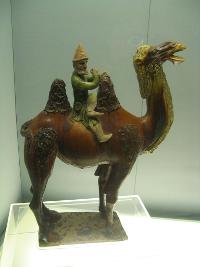
Pottery, man blowing musical instrument on camel. Tang. 618-907AD.
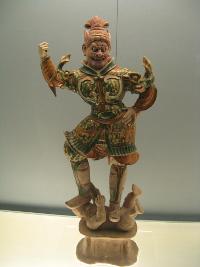
Pottery Heavenly Guardian. Tang. 618-907AD.

Tomb guardian beast. Tang. 618-907AD.

Pottery horse. Tang. 618-907AD.

Woman w/parrot on hand. Tang. 618-907AD.
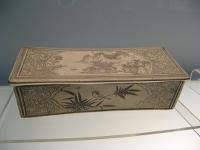
Pillow w/black landscape design on white ground. Cizhou ware. Yuan. 1271-1368AD.
The Chinese dating wasn't very good. Most works were dated to dynasties rather than specific time periods.

Pottery pillow w/glazed bird and flower design. Cizhou ware. Jin-Yuan. 1115-1368AD.

Turtle-shall glazed pitcher. Jizhou ware. S. Song-Yuan. 1127-1368AD.
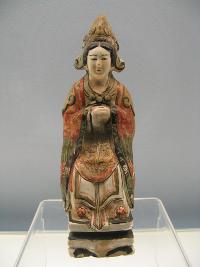
Seated woman. Cizhou ware. 1115-1234AD.
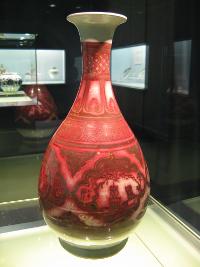
Vase with reserved underglaze red designs of figures. Jingdezhou ware. Hong Wu reign, 1368-98AD.
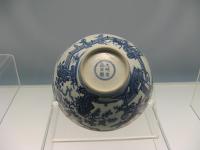
Bowl w/figures. Jingdezhou ware. Xuande reign. 1326-35AD.
The blue China, though the most recognisable of the China, was also the most boring.
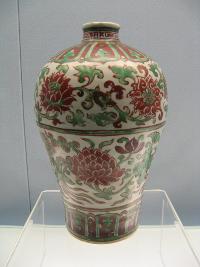
Vase w/lotus flowers. Jingdezhou ware. Early 15th c.
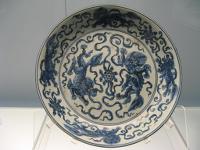
Dish w/2 lions playing with a ball. Jingdezhou ware. Mid-15th c.
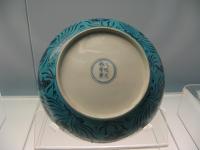
Turquoise glazed dish with lotus and fish. Jingdezhou ware. Chenghua reign. 1465-87AD.
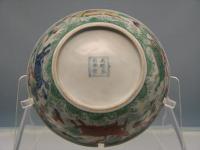
Doucai (contrasting colour) dish. Jingdezhou ware. Chenghua reign. 1465-87AD.
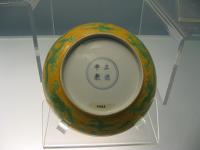
Dish w/green dragon on yellow ground. Jingdezhou ware. Zhengde reign. 1506-21AD.

Jar w/wucai design of dragon medallions. Jingdezhou ware. Jinjiang reign. 1522-66AD.
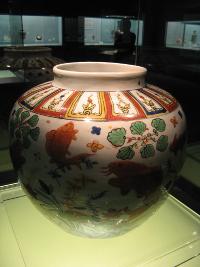
Jar w/wucai design of fish and algae (! - maybe the translation was wrong). Jingdezhou ware. Jinjiand reign. 1522-66AD.

Man blowing a conch on an animal. Jingdezhou ware. Wanli reign. 1573-1620AD.
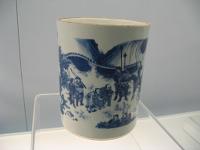
Brush pot w/landscapes and figures. Jingdezhou ware. Chongzhen reign. 1628-44AD.
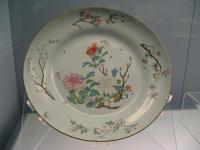
Famille rose dish w/peony design. Jingdezhou ware. Yongzhen reign. 1723-35AD.
The period is considered to have been the epitome of Qing China as far as China is concerned.
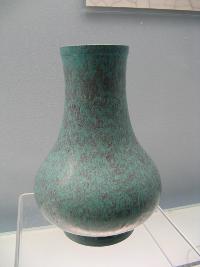
Robin's egg glazed vase. Jingdezhou ware. Yongzheng reign. 1723-35AD.
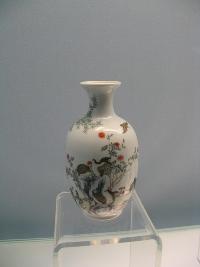
Vase with enameled design of bamboo, chrysanthemum and quails. Qianlong reign. 1731-95AD.
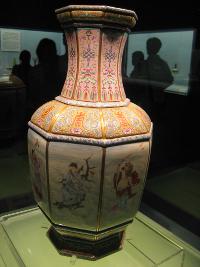
Vase with fencai design of immortals. Jingdezhou ware. Qianlong reign. 1736-95AD.
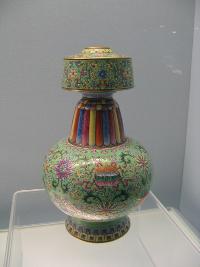
Tibetan vase with fencai design of 8 auspicious symbols on green ground. Jingdezhou ware. Qianlong reign. 1736-95AD.
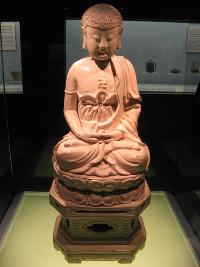
Buddha statue. Zhangzhou ware. Chenghua reign. 1465-87AD.
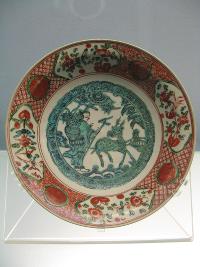
Wucai dish with design of human figures, flowers and birds. Zhangzhou-type ware. Early 17th c.
Then it was painting time. To preserve the paintings, the galleries with fitted with lights that were usually dim but intensified in brightness when visitors went near the specific works. Before I figured this out I was being driven mad because I thought they were playing with the lights just because.
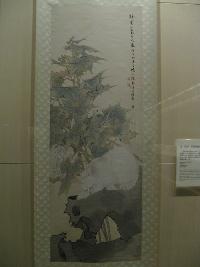
Lotus and a white cat. Renyi. 1882AD.
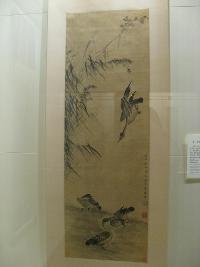
Wild geese in reed marshes. Li Yin. 1662AD.
I do not like Chinese painting for the same reason I don't like modern art - the shapes tend to be indistinct and unrepresentative of real life, especially in the treatment of the human form (due, I wager, to the type of brush used). Furthermore, the full range of colours is never used, so we are left with paintings which cannot capture the richness of the spectrum of colours of the world around us.
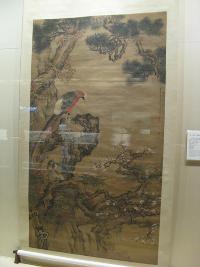
Sunflower and pheasant. Shen Quan. 1762.
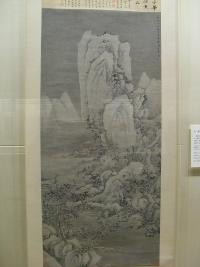
Fishing in snow. Tang Di. 1352.
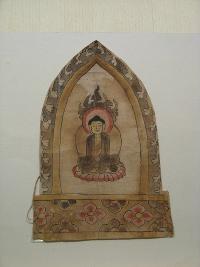
This was the first example in the painting gallery: "Image of Sakyamuni Buddha. Tang." They called the strokes simple and bold. I say a kid today could do better.
Then I walked quickly through the calligraphy gallery, since I wasn't fond of it. A lot of the works were imitations of ancient inscriptions. I didn't see the point of this.
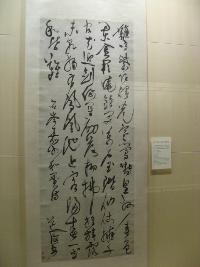
A peom (sic) by Cen Shen by Chen Chun [Ed: ?]. Ming.
Anyhow write one.
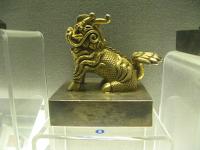
Qing/Ming seal (at this point, they'd ran out of descriptions of individual items in English, probably figuring, as in other museums in non-English speaking countries, that tourists would not bother coming so far up)

Warring States coins.
They had some coins from the Silk Road (eg from the Greek successor kingdoms) which were more interesting than the boring indigenous Chinese coins, since they had the heads of rulers on them.
There was also a furniture gallery I skimmed through.
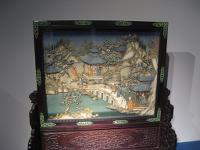
Screen set in stand with removable dyed ivory-inlaid panel.
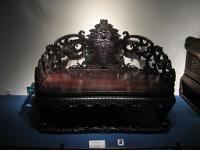
Throne chair. Qing.
These are ridiculously big and thus must be uncomfortable to sit on since you can't rest on their backs (probably to convey the impression of size on the part of the ruler and emphasising his grandeur). Though they're probably good for making out due to their size.
There was a gallery dedicated just to Jade.
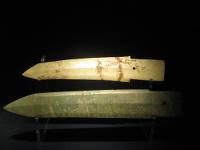
Jade Haldberds (!)
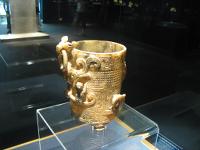
Jade wine vessel with design of scarlet bird holding ring in mouth, stamping on tiger. W. Han. 206-8AD.
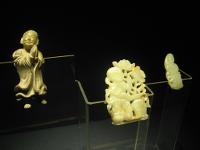
Arhat, boy with flowers, Song Dancer. Liao.
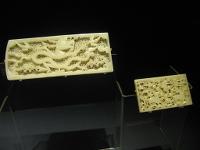
Belt ornament with dragon, deer designs. Ming.
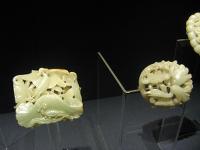
Ornament with turtle and crane, hunting. Yuan.
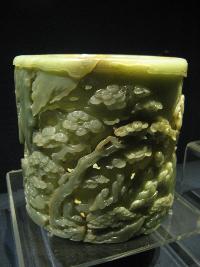
Brushholder with 9 old men. Qianglong reign.
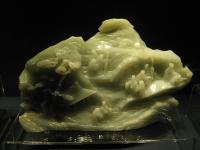
Mountain with figures. Qianlong reign.
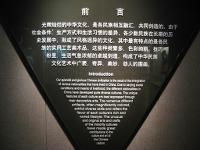
"Our splendid and glorious Chinese civilization is the result of the integration of various nationalities that have lived in China. Due to varying social conditions and means of livelihood, the different nationalities in China have developed quite diverse cultures. The unique features of each culture are best expressed through their decorative arts. The numerous different artifacts, often magnificently colored, exhibit diverse skills and reflect the flavor of each culture's rich and varied lifestyle. The unusual and original arts and crafts of the minority cultures have made great contributions to the culture and art of the Chinese nation."
Propaganda. Naturally, no mention was made of the oppression of the minorities by past and present governments.
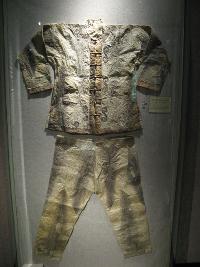
Men's salmon skin jacket and trousers with applique. Hezhen people, Heilongjiang. Late 20th c.
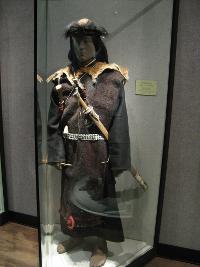
Man's wool coat. Lhaha nationality. Chayu, Tibet. Late 20th c.
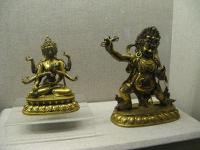
Gilt copper ushnishavijaya, Bronze buddha. Tibet. Qing.
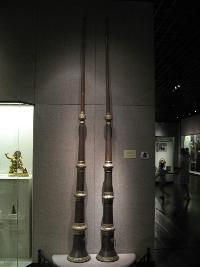
Tibetan silver bound long red copper horns. Late 20th c.
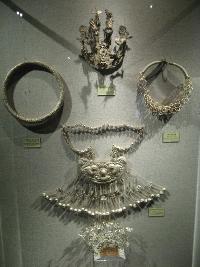
Miao jewelry
They claimed that among almost all minorities, the articles for daily use were of a decorative nature. I suspect exoticisation of the Other.
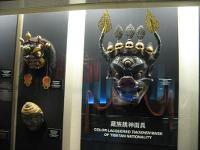
Tibetan masks
Then there was the final instalment of American Art.
Yuskavage's Transference portrait of my shrink in her starched nightgown with my face and her hair, 1995 was very wth.
Basquiat's Man from Naples, 1982 was just grafitti.
We then left the museum to walk to Fuxing Park and the French Concession.

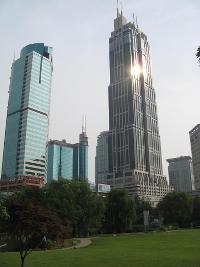
Buildings near some park
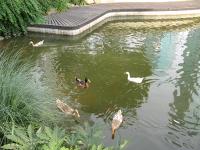
Ducks
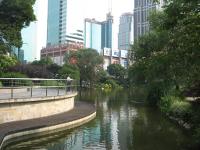
Pond
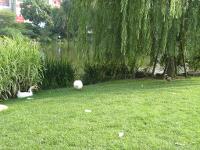
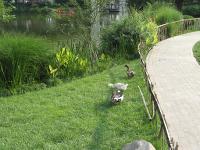
The ducks were very tame and didn't shy away from us. One even picked at a chicken bone (ugh).
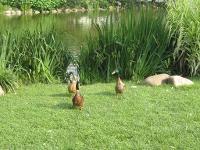
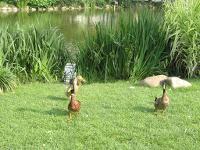
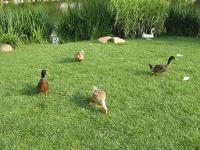
Ducks again
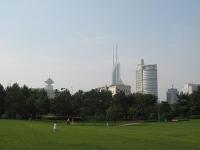
Park
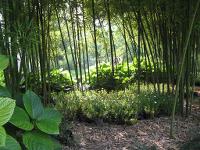
Bamboo at knee level
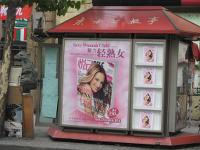
魅力轻熟女 - 'Sexy Woman Child magazine'. The Chinese below reads: "Pay $15 and be happy for 30 days"
Maybe they were trying to appeal to the male lust for lolitas and jailbait. Or maybe it was just a mistranslation. I'd go with: "Glamour magazine for the young sophisticate"
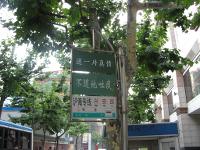
Even bus stop signs have propaganda: "Send your sincere feelings to others. Don't spit."
We can see where Singapore learnt to conduct Campaigns from.

Even overhead crossings have propaganda: "Soldiers, civilians, fish and water feelings, together we will build the Great Wall of China"
Xephyris's better translation: "The Military And The People Are Like Fish and Water. United We Stand As Firm As The Great Wall"

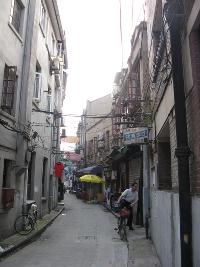
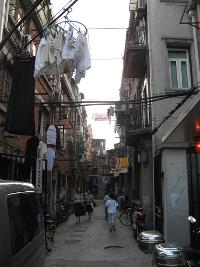
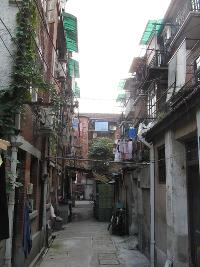
Alleys along Chongqing Road South
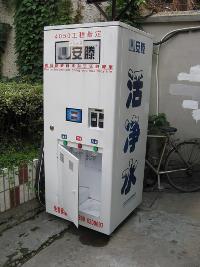
Clean water dispenser
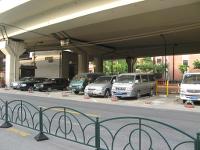
How to stop people speeding out of the carpark without paying
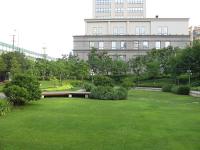
Yu Lan park
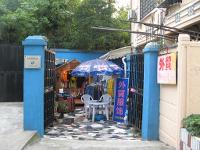
For some reason I was amused by this shop.
Fuxing park was done in the European style, unlike a Chinese garden. It was also very crowded, surely due to Occidentalism.
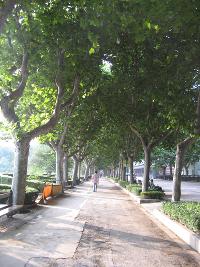
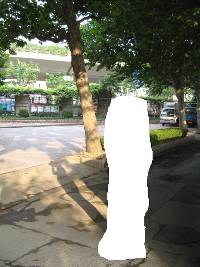
Almost all women in Shanghai I saw tied up their hair, despite it being slightly cooler than Singapore. Hurr hurr.
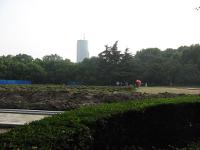
Unfortunately, renovations were underway

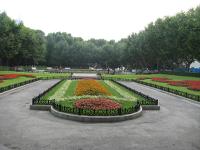
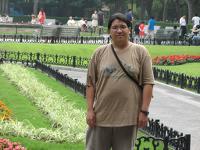
Me in Fuxing park
I saw a 4 or 5 year old girl in leggings. Ugh.
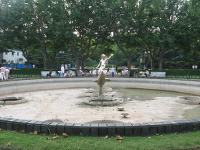
??? fountain (empty)

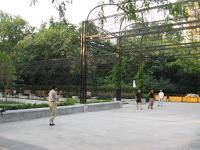
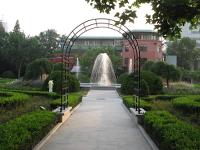
More of the park
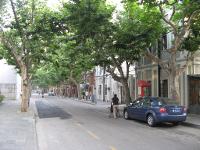
French Concession - Sinan Road.
The whole place was like this - leafy trees at the side of the road and old short buildings at the side.
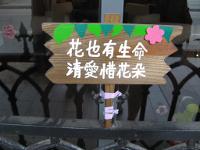
A sign urging us to love flowers at Tammy's Sweet Dream, a tourist trap restaurant. Ironically there were no flowers nearby.
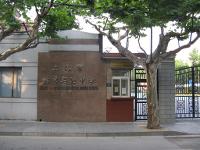
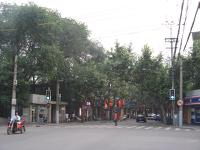
Intersection of Fuxing and Maoming
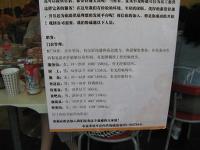
Discrimination in hiring practises (age and gender)
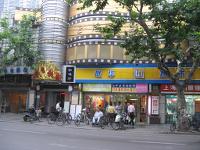
Shop: "England Amorous Feelings". Wth. "风情" is "character and style", according to Babelfish. MFTTW: HIYAH i ask my chinese labmate. -_- altavista is right he says. it is like the collective for style, behavior, etc associated with the particular thing that you are trying to describe
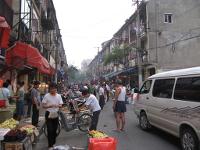
Yongkang road.
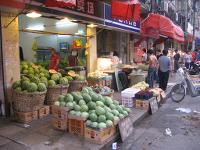
Watermelons (all with seed and only light green in colour)
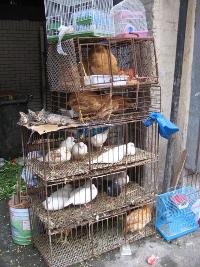
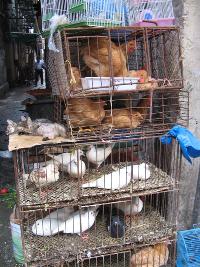
Chickens
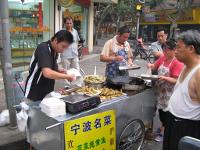
Yellow Fish (?)
Signs indicating road names in Shanghai are helpful, since they tell you which way is east and which west (or north and south) and there's a mark on the sign to tell you when the road's terminated.
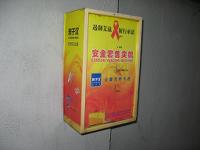
Condom vending machine, probably in a red light district
Taxis in Shanghai have this plastic screen separating the driver from the rest of the taxi, to prevent assault or robbery.

(Bad) Occidentalism. Stupid nouveau riche.
For dinner we went to a restaurant in some hotel. Johnny wanted to try pork, and was looking for one dish (and one dish only) - deep fried pork with curry, with basil on top (he claims you can find this in every zi cha in Singapore). They didn't have it, so we had other things.